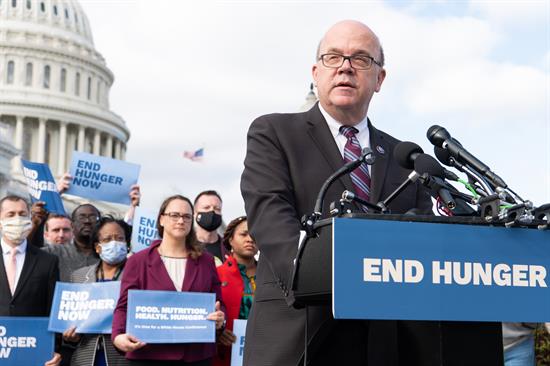McGovern Resolution on Nutrition Education in Medical Schools Passes House
Washington,
May 17, 2022
WASHINGTON—Congressman James P. McGovern, Chairman of the House Rules Committee, (D-MA) applauded passage today by the House of Representatives of a bipartisan resolution he authored alongside Congressman Michael C. Burgess, M.D. (R-TX) that calls for medical schools, residency, and fellowship programs to provide nutrition education that demonstrates the connection between diet and disease. McGovern has led the push for a White House conference on Hunger, Nutrition, and Health. Earlier this month President Joe Biden announced that his administration would convene such a conference—the first in over 50 years. Obesity, type-2 diabetes, heart disease, cancer, and stroke are among the leading causes of death and disability nationwide and are inextricably linked to diet. Moreover, the economic costs related to diagnosed diabetes exceed $300 billion per year and the costs related to obesity exceed $200 billion per year. Despite the human and economic toll, physicians in training receive little to no education on the relationships between diet, food and health—often lacking the skills to counsel patients. McGovern’s resolution, which directly addresses the lack of nutrition training in medical education, was drafted following a Congressional Briefing organized by the Nutrition Education Working Group—a group of nationally-recognized leaders in nutrition science, education, and food and health policy who meet regularly at Harvard’s T.H. Chan School of Public Health. “We cannot continue to ignore the correlation between diet and health. It’s time to make sure our medical providers are equipped with the best knowledge and tools to help their patients,” McGovern said on the House Floor, just prior to the resolution’s passage. “I want to thank Dr. Burgess for his partnership in this important bipartisan effort. Nutrition, food access, and health are not only directly connected to each other, they are directly connected to our progress as a nation. It is time we treat them as such.” “As a cardiologist, I’ve witnessed first hand the needless patient suffering that follows from the lack of attention to diet,” said Dr. Stephen Devries, a preventive cardiologist who co-leads the Nutrition Education Working Group with Dr. Walter Willett based at the Harvard School of Public Health. “Sadly, physicians typically haven’t played a meaningful role in helping to guide patients to better nutrition because they haven’t received the nutrition education they need. Medical educators often report that there isn’t time in the curriculum to teach nutrition, but somehow time is always found to educate physicians about the latest drugs and procedures. I am very appreciative of the high-level acknowledgment of the importance of this issue evidenced by the bipartisan support and passage this week of the U.S. House of Representatives Resolution on Nutrition Education in Physician Training. Does it take an act of Congress to finally convince medical educators that nutrition education for physicians is not optional? Apparently, the answer is, yes.” “I am thrilled that the House of Representatives passed a resolution today calling for widespread and meaningful nutrition education for physicians and other health care professionals. We have long known that food and nutrition play a vital role in health and wellness, affecting both individuals and society as a whole. This resolution demonstrates that the education of healthcare providers about these topics is a national priority, and I am hopeful that it will move us towards a future where our next generation of doctors, nurses, physicians assistants, and other providers will have the knowledge needed to promote health and address diet-related health conditions for their patients,” said Emily Broad Leib, Clinical Professor of Law, Harvard Law School. “The American College of Lifestyle Medicine (ACLM) applauds the extraordinary efforts of Congressman Jim McGovern and Congressman Michael Burgess in leading the House of Representatives to formally recognize that the epidemic of chronic disease that plagues our population is, in fact, primarily diet and lifestyle related, and that the gaping void in nutrition education across the spectrum of medical education has left our health care system ill-equipped to address the needs of patients suffering from type 2 diabetes, cardiovascular disease and other such chronic conditions. ACLM stands ready to fill that void with quality educational materials, resources, events and support for the current generation of health care providers and the next one to follow. We look forward to working with Congress and the Administration to help create a work force that can give new hope to patients who for generations have been told their conditions cannot be reversed, but only managed.” |
Press Releases
Constituent Services
Read More
How can I help?
From getting answers from government agencies to cutting through red tape to get you results, my office is here to help.
